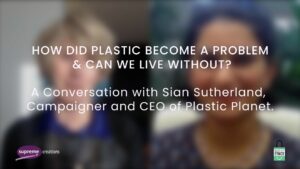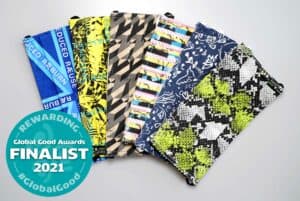What should face coverings be made of?
If you have been wearing a mask for the past couple of weeks, you probably already know how important the choice of fabric is. Yes, you want it to be as filtering and protective as possible, but it also needs to be comfortable.
You might also be aware of the waste single-use masks can generate, in which case you will be looking for the most sustainable option to shop in, and travel around on public transport safely. With this flood of brand new products on the market and on the internet, knowing what to look for in a face covering can be an overwhelming and complicated task. So what should face coverings be made of?
WHAT FABRIC SHOULD MY FACE COVERING BE MADE OF?
You should be looking for a fabric that allows clear breathing, and that does not saturate easily with moisture. Tightly woven organic cotton is amongst the best options on the market. Cotton being a natural fibre, you can be assured you won’t be inhaling high amounts of synthetic materials (unlike some nylon, polyester or polypropylene options), which can be responsible for respiratory diseases.
You typically need at least 2 layers of cotton for your mask to be efficient.
You can also easily upcycle some of your own fabric scraps to make a DIY mask, which makes a very low carbon footprint face covering.
For extra comfort and softness, why not choose cotton satin? Its special weaving gives the fabric a sheen and silky feel, making it super soft and gentle on the skin!
Finally, don’t underestimate the importance of design: You will make more use of a mask with an attractive print, or a cool design – which will make up for the face covering’s small carbon footprint!
SHOULD MY FACE COVERING INCLUDE A FILTER?
Do you have a specific medical condition? Has your doctor instructed you to wear one? Do you work as a key worker around people who might be infected by Covid-19? If the answer is no, then your face mask does not need a filter.
Filters are still critically needed by our healthcare and frontline workers, and are in short supply at the moment. The Government has urged the public to avoid using surgical face masks and other PPE to save them for the professionals, such as the NHS workers, needing them most.
WHAT TYPE OF ELASTICS SHOULD BE USED?
When you invest in a reusable mask, you’ll want to make sure that it’s truly durable, and although often forgotten, the elastics play an important part of it.
They should be confortable around your ears/head, but still stay stretchy wash after wash.
Too tight, and the face covering might get uncomfortable and leave marks on your face; too lose and it might allow particles in and out of your mask, putting others at risk.
Material wise, spandex is a great option as it’s latex-free (and latex can cause allergies).
Finally, don’t forget buckles are a great extra to adjust the fit of your face covering!
WHICH FACE COVERING IS MORE ECO-FRIENDLY?
With a lifespan of 450 years, disposable masks can have dramatic consequences on our planet. This new type of plastic pollution is added to our current waste stream, threatening our wildlife and damaging our waterways.
To reduce this plastic pandemic, we all need to chose our reusable masks wisely, and ask ourselves the right questions: Is the fabric 100% cotton? Is it organic? Is it biodegradable? Are the elastics recyclable? Is it ethically sourced and manufactured?
At Bags of Ethics, we made sure our new range of face masks ticked all the boxes! They are made of premium satin cotton fabric, and were printed with European Union REACH compliant inks, in our ethically audited factory.
Our masks can be the perfect added layer of protection for you and the people around you when you use it along with regular hand washing and social distancing measures, such as staying 6 feet away from others.
To shop our range of sustainable, reusable face coverings, visit https://bagsofethics.org/shop/.





